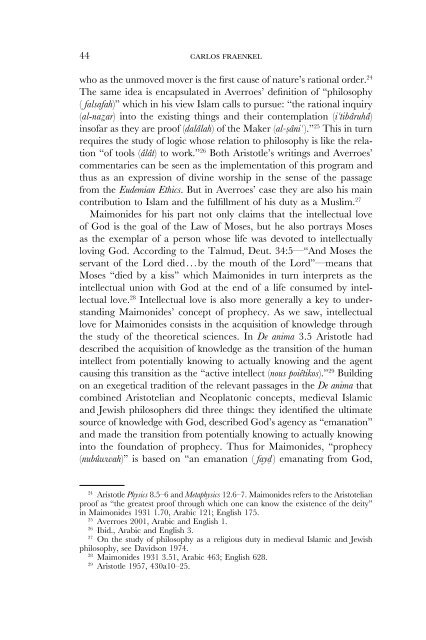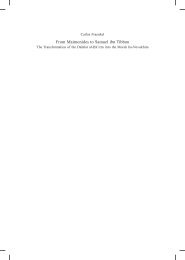Download PDF - Carlos F. Fraenkel
Download PDF - Carlos F. Fraenkel
Download PDF - Carlos F. Fraenkel
Create successful ePaper yourself
Turn your PDF publications into a flip-book with our unique Google optimized e-Paper software.
44 carlos fraenkelwho as the unmoved mover is the first cause of nature’s rational order. 24The same idea is encapsulated in Averroes’ definition of “philosophy( falsafah)” which in his view Islam calls to pursue: “the rational inquiry(al-naar) into the existing things and their contemplation (itibâruhâ)insofar as they are proof (dalâlah) of the Maker (al-âni ).” 25 This in turnrequires the study of logic whose relation to philosophy is like the relation“of tools (âlât) to work.” 26 Both Aristotle’s writings and Averroes’commentaries can be seen as the implementation of this program andthus as an expression of divine worship in the sense of the passagefrom the Eudemian Ethics. But in Averroes’ case they are also his maincontribution to Islam and the fulfillment of his duty as a Muslim. 27Maimonides for his part not only claims that the intellectual loveof God is the goal of the Law of Moses, but he also portrays Mosesas the exemplar of a person whose life was devoted to intellectuallyloving God. According to the Talmud, Deut. 34:5—“And Moses theservant of the Lord died . . . by the mouth of the Lord”—means thatMoses “died by a kiss” which Maimonides in turn interprets as theintellectual union with God at the end of a life consumed by intellectuallove. 28 Intellectual love is also more generally a key to understandingMaimonides’ concept of prophecy. As we saw, intellectuallove for Maimonides consists in the acquisition of knowledge throughthe study of the theoretical sciences. In De anima 3.5 Aristotle haddescribed the acquisition of knowledge as the transition of the humanintellect from potentially knowing to actually knowing and the agentcausing this transition as the “active intellect (nous poiêtikos).” 29 Buildingon an exegetical tradition of the relevant passages in the De anima thatcombined Aristotelian and Neoplatonic concepts, medieval Islamicand Jewish philosophers did three things: they identified the ultimatesource of knowledge with God, described God’s agency as “emanation”and made the transition from potentially knowing to actually knowinginto the foundation of prophecy. Thus for Maimonides, “prophecy(nubûwwah)” is based on “an emanation ( fay ) emanating from God,24Aristotle Physics 8.5–6 and Metaphysics 12.6–7. Maimonides refers to the Aristotelianproof as “the greatest proof through which one can know the existence of the deity”in Maimonides 1931 1.70, Arabic 121; English 175.25Averroes 2001, Arabic and English 1.26Ibid., Arabic and English 3.27On the study of philosophy as a religious duty in medieval Islamic and Jewishphilosophy, see Davidson 1974.28Maimonides 1931 3.51, Arabic 463; English 628.29Aristotle 1957, 430a10–25.



